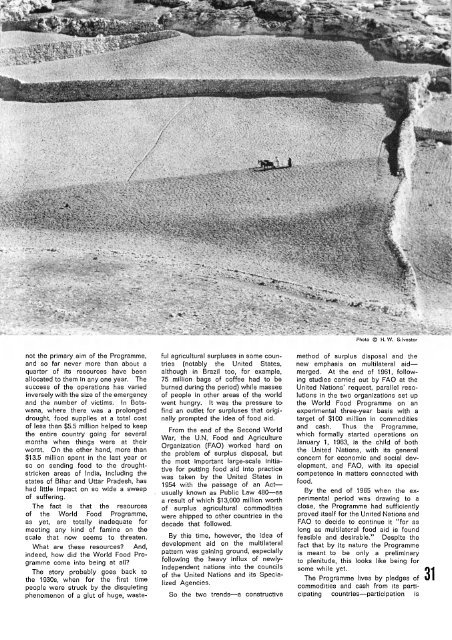Marie Curie; The Unesco courier: a window ... - unesdoc - Unesco
Marie Curie; The Unesco courier: a window ... - unesdoc - Unesco
Marie Curie; The Unesco courier: a window ... - unesdoc - Unesco
Create successful ePaper yourself
Turn your PDF publications into a flip-book with our unique Google optimized e-Paper software.
'Ifv',. >.<br />
" -rfft<br />
l«\*.¿ **H# . Photo © H. W. Silvester<br />
not the primary aim of the Programme,<br />
ful agricultural surpluses in some coun¬<br />
method of surplus disposal and the<br />
and so far never more than about a<br />
tries (notably the United States,<br />
new emphasis on multilateral aid<br />
quarter of its resources have been<br />
allocated to them in any one year. <strong>The</strong><br />
although in Brazil too, for example,<br />
75 million bags of coffee had to be<br />
merged. At the end of 1961, follow¬<br />
ing studies carried out by FAO at the<br />
success of the operations has varied<br />
burned during the period) while masses<br />
United Nations' request, parallel reso¬<br />
inversely with the size of the emergency<br />
of people in other areas of the world<br />
lutions in the two organizations set up<br />
and the number of victims. In Bots¬<br />
wana, where there was a prolonged<br />
went hungry. It was the pressure to'<br />
find an outlet for surpluses that origi¬<br />
the World Food Programme on an<br />
experimental three-year basis with a<br />
drought, food supplies at a total cost<br />
of less than $5.5 million helped to keep<br />
the entire country going for several<br />
months when things were at their<br />
worst. On the other hand, more than<br />
$13.5 million spent in the last year or<br />
so on sending food to the droughtstricken<br />
areas of India, including the<br />
states of Bihar and Uttar Pradesh, has<br />
had little impact on so wide a sweep<br />
of suffering.<br />
<strong>The</strong> fact is that the resources<br />
of the World Food Programme,<br />
as yet, are totally inadequate for<br />
meeting any kind of famine on the<br />
scale that now seems to threaten.<br />
What are these resources? And,<br />
indeed, how did the World Food Pro¬<br />
gramme come into being at all?<br />
<strong>The</strong> story probably goes back to<br />
the 1930s, when for the first time<br />
people were struck by the disquieting<br />
phenomenon of a glut of huge, waste<br />
nally prompted the idea of food aid.<br />
From the end of the Second World<br />
War, the U.N. Food and Agriculture<br />
Organization (FAO) worked hard on<br />
the problem of surplus disposal, but<br />
the most important large-scale initia¬<br />
tive for putting food aid into practice<br />
was taken by the United States in<br />
1954 with the passage of an Act<br />
usually known as Public Law 480 as<br />
a result of which $13,000 million worth<br />
of surplus agricultural commodities<br />
were shipped to other countries in the<br />
decade that followed.<br />
By this time, however, the idea of<br />
development aid on the multilateral<br />
pattern was gaining ground, especially<br />
following the heavy influx of newlyindependent<br />
nations into the councils<br />
of the United Nations and its Specia¬<br />
lized Agencies.<br />
So the two trends a constructive<br />
target of $100 million in commodities<br />
and cash. Thus the Programme,<br />
which formally started operations on<br />
January 1, 1963, is the child of both<br />
the United Nations, with its general<br />
concern for economic and social dev¬<br />
elopment, and FAO, with its special<br />
competence in matters connected with<br />
food.<br />
By the end of 1965 when the ex¬<br />
perimental period was drawing to a<br />
close, the Programme had sufficiently<br />
proved itself for the United Nations and<br />
FAO to decide to continue it "for as<br />
long as multilateral food aid is found<br />
feasible and desirable." Despite the<br />
fact that by its nature the Programme<br />
is meant to be only a preliminary<br />
to plenitude, this looks like being for<br />
some while yet.<br />
<strong>The</strong> Programme lives by pledges of<br />
commodities and cash from its parti¬<br />
cipating countries participation is<br />
31
















